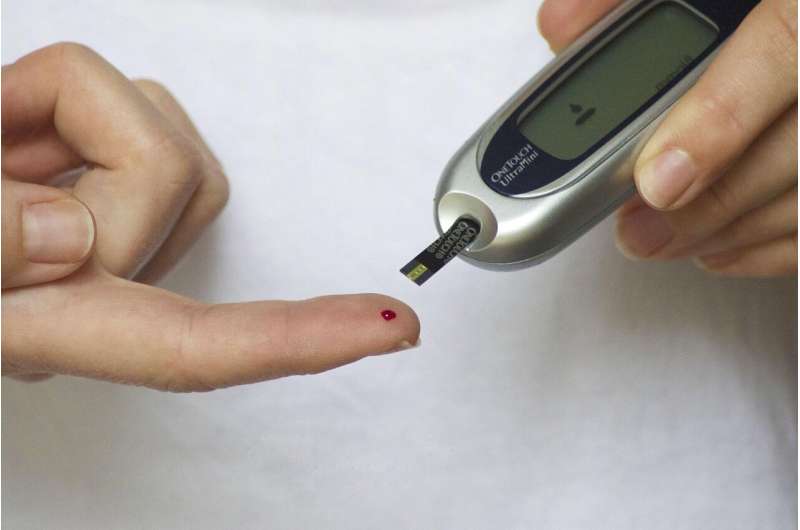This article has been reviewed according to Science X's editorial process and policies. Editors have highlighted the following attributes while ensuring the content's credibility:
fact-checked
peer-reviewed publication
trusted source
proofread
New study examines off-label drugs prescribed in addition to insulin for type 1 diabetes

Two classes of drugs prescribed off-label for some patients with type 1 diabetes can provide significant benefits, but also come with health concerns, according to a study by UT Southwestern Medical Center researchers. The findings, published in The Journal of Clinical Endocrinology & Metabolism, provide a rare view of real-world use of these medications, which are growing in popularity among patients with type 1 diabetes as adjuvants to insulin.
"These findings, from our real clinic experience, show both benefits and some risk to patients with type 1 diabetes who take these medications in addition to insulin treatment," said study leader Ildiko Lingvay, M.D., M.P.H., M.S.C.S., Professor of Internal Medicine in the Division of Endocrinology and in the Peter O'Donnell Jr. School of Public Health at UT Southwestern.
Nearly 1.5 million Americans have type 1 diabetes, an autoimmune disease that destroys insulin-producing cells in the pancreas. Without this hormone, cells can't take in glucose, leading to dangerously high blood sugar levels that can cause a host of short- and long-term problems. These can include diabetic coma, blindness, neuropathy, and a condition called diabetic ketoacidosis (DKA), in which the blood becomes dangerously acidic, necessitating emergency care.
Type 1 diabetes is universally treated with insulin injections. However, explained Dr. Lingvay, because only a fifth of patients with type 1 diabetes in the U.S. achieve the blood sugar control that the American Diabetes Association recommends, doctors are increasingly prescribing medications known as glucagon-like peptide-1 receptor agonists (GLP-1RAs) and/or sodium-glucose cotransporter-2 inhibitors (SGLT2is) to help patients reach this goal.
Furthermore, both classes of medications have been shown in patients with type 2 diabetes to decrease the risk of cardiac and renal events and help promote weight loss, effects that also would greatly benefit patients with type 1 diabetes. However, the risk-benefit ratio of these medications has not been fully vetted in this patient population.
In fact, both classes of drugs have been associated with increased risk of severe hypoglycemia and DKA when used in patients with type 1 diabetes. Because both positive and negative effects of GLP-1RAs and SGLT2is were shown in strictly regulated clinical trials, their real-world effects have been unclear.
To examine their efficacy, Dr. Lingvay, along with colleagues Khary Edwards, M.D., a former Endocrinology fellow at UTSW, and Xilong Li, M.B.A., Senior Database Analyst at UTSW, searched medical records for type 1 diabetes patients treated at UT Southwestern who used any GLP-1RAs and/or SGLT2is for at least 90 days before Oct. 31, 2021. Their search turned up 104 patients: 65 who had used GLP-1RAs exclusively, 28 who had used SGLT2is exclusively, and 11 who had used both either concurrently or sequentially.
After a year of use, patients on GLP-1RAs had significant reductions in weight, glycated hemoglobin A1C (a three-month average measure of blood sugar), and total daily dose of insulin. SGLT2i users had significant reductions in hemoglobin A1C and basal insulin, a baseline dose delivered outside of meals.
However, SGLT2i users were about three times more likely than GLP-1RA users to experience DKA. Just over a quarter of patients taking either class of drugs stopped due to side effects such as gastrointestinal problems.
The study authors say these results suggest both types of drugs can be beneficial to patients with type 1 diabetes, but close monitoring is required. Specifically when using SGLT2is, extreme caution is advised in selecting patients with the lowest risk of DKA, performing detailed education about the risk of DKA, and ensuring careful monitoring to prevent its occurrence.
"When viewed holistically at the person level, all of these small changes can add up to substantial overall clinical benefits, especially considering that improving glycemic control in patients with long-standing T1DM [type 1 diabetes mellitus] can be challenging," the researchers wrote.
More information: Khary Edwards et al, Clinical and Safety Outcomes With GLP-1 Receptor Agonists and SGLT2 Inhibitors in Type 1 Diabetes: A Real-World Study, The Journal of Clinical Endocrinology & Metabolism (2022). DOI: 10.1210/clinem/dgac618




















